Answer these simple questions and we will find you the BEST prices
Which type of solar quotes do you need?
It only takes 30 seconds
100% free with no obligation

Get up to 4 quotes by filling in only 1 quick form

Install a heat pump for less with the BUS grant

We’ve helped over 500,000 homeowners reduce their carbon footprint
- GreenMatch
- Air Source Heat Pumps
- Underfloor Heating
Air Source Heat Pump Underfloor Heating: How Does It Work?

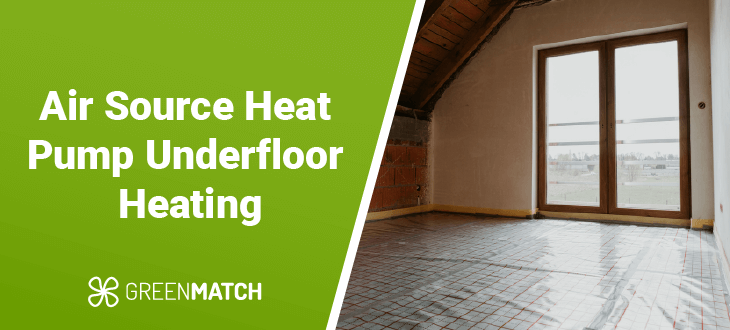
- With an air source heat pump, underfloor heating provides warm air at low operating costs, higher sustainability, and increases the value of your home.
- Underfloor heating, on its own, can cost between £2,300 and £11,500 to install.
- Installing an air source heat pump with underfloor heating can cost between £13,000 and £26,000.
- Air source heat pump underfloor heating is easier to install in newly-built homes than in retrofit projects.
Air source heat pumps are a powerful technology for many reasons. They allow for great savings and are eco-friendly. Another advantage, if your home can support it, is installing an air source heat pump underfloor heating system. These are especially fitting for homes under renovation and newly built properties but retrofits can be more costly to implement.
The process of installing heat pumps can be complicated. This is why we recommend finding a reliable, professional installer. However, searching for one can be time-intensive, often taking days of research and calling up companies. That’s why our service is a far better, quicker alternative.
We can easily provide up to 4 free, non-binding quotes from reliable installers in our network. Heat pumps are expensive, so it's best to find an installer who has been thoroughly vetted. All you have to do is click the button below and fill out a quick, 30-second form to get started.
- Quotes from local engineers
- Payment by finance available
- Save £7,500 with BUS grant
It only takes 30 seconds



- How does underfloor heating with a heat pump work?
- Can you install air source heat pump underfloor heating in every home?
- Costs of an underfloor heating air source heat pump
- What are the best underfloor heating heat pumps?
- What are the advantages of heat pump underfloor heating?
- What are the disadvantages of heat pump underfloor heating?
- Is the combination of underfloor heating with an air source heat pump the right choice for my home?
- FAQ
How does underfloor heating with a heat pump work?
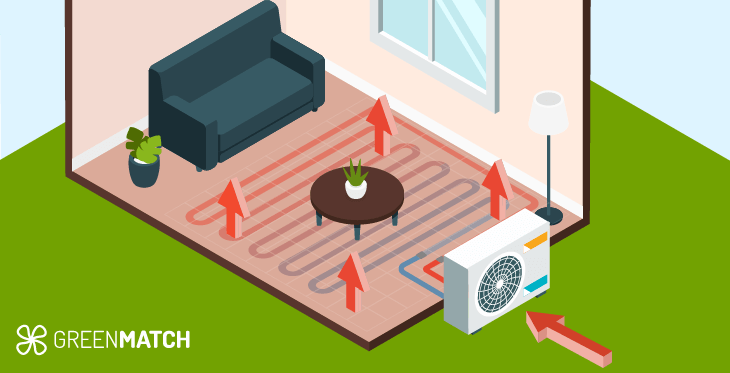
Underfloor heating circulates heat through cross-linked pipes, usually made from polyethylene, concealed beneath a layer of cement mortar and a final screed. During the winter season, the mortar absorbs heat from the pipes and transfers it to the screed above. The warmth can then pass to the room's walls and ceiling primarily through radiation and, to a lesser extent, through natural convection.
In summer, this process reverses as the floor absorbs heat from the walls and ceiling through radiation and convection, which is then conveyed to the mortar bed and underfloor heating pipes, eventually dissipating outside the house via water circulation. An air source heat pump can assist in the entire process and amplify its effectiveness.
It does this by absorbing heat and passing it through the water that the underfloor heating will use. That’s why any heat pump for underfloor heating, whether air source or ground source, needs to have a water connection as well. It’s also important to distinguish between electric and water-based underfloor heating systems.
| Electric underfloor heating | Water underfloor heating | |
|---|---|---|
| Mode of operation | Electric heating wires or heating mats that are connected to the electricity supply | Pipes that pump water in underfloor circuits deriving heat from a heat source |
| Heat source | Electric, independent, and not reliant on central heating or heat pumps | Reliant on gas boiler, heat pump, or another source of heating |
| Type of home | Renovation projects and single rooms | Better for new-build projects and larger spaces |
| Operational costs | More expensive than water systems | Lower running costs in long-term |
| Installation costs | Less expensive to install | More expensive to install |
| Installation period | Fast installation (some systems can be fitted in a few hours) | Can take days, depending on the size and type of flooring |
For the purposes of this page, we will mostly be referring to water-based systems because they are the most compatible with air source underfloor heating systems. More specifically, air to water source heat pumps can help heat water and pass it through the underfloor heating system. Electric underfloor heating is independent of external heating systems, so, while it can work alongside a heat pump, it will not benefit from the presence of one for its heat generation.
Can you install air source heat pump underfloor heating in every home?
Not every home is suitable for underfloor heating. There are quite a few factors to consider before installing such a heating system:
Underfloor heating can be installed under numerous types of floors. These include concrete slabs, suspended slabs, staple-up, and plywood installations.
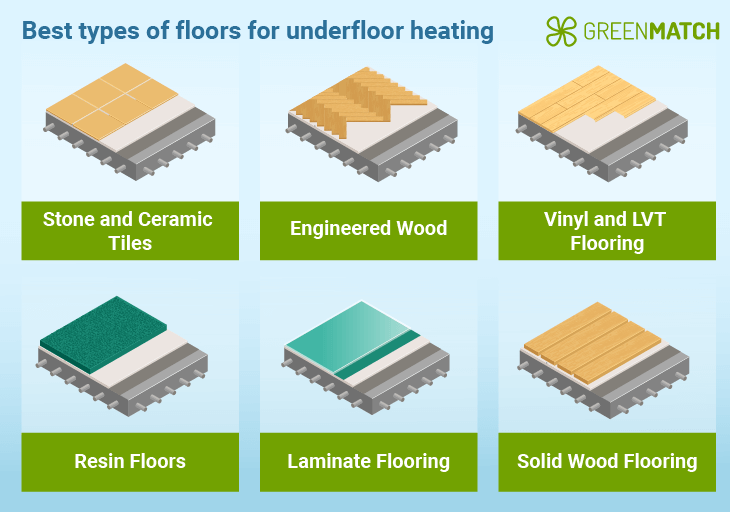
The best flooring materials for underfloor heating are those with high thermal conductivity and heat retention properties. Here are a few of the common flooring types and how effective they are:
When choosing the best flooring for underfloor heating, factors such as thermal conductivity, heat retention, moisture control, and compatibility with floor sensors to limit temperature should be considered to ensure the optimal performance of the heating system.
The heat retention of resin and laminate floors is lower than wood or stone, so heating should not exceed 27°C to 30°C. Similarly, solid wood flooring can work but it needs to be treated against moisture and properly prepped.
Costs of an underfloor heating air source heat pump
Since an air source heat pump and underfloor heating can only work together with water-based systems, the combined prices start at £13,000. Air to water heat pumps cost roughly £8,750 to £14,050, with underfloor heating costing between £4,000 and £11,500.
| Cost of underfloor heating with air source heat pump | |
|---|---|
| Underfloor heating (water-based) | £4,000 - £11,500 |
| Air source heat pump costs + labour | £8,750 - £14,050 |
| Total cost | £13,000 - £26,000 |
Underfloor heating costs can vary based on different factors. Here is a breakdown of different types of underfloor heating jobs:
| Water underfloor heating costs for the average UK home | |||
|---|---|---|---|
| Type of project | Installation time | Standalone cost | Total cost with heat pump |
| New build | 4 - 6 days | £4,000 - £4,500 | £12,750 - £18,550 |
| Renovation or retrofit | 5 - 7 days | £10,000 - £11,500 | £18,750 - £25,550 |
Let’s break down the costs of underfloor heating. We used 76 m2 as the size of the average UK home. The cost of water-based underfloor heating is between £120 - £135 per m2, which can be between £9,000 - £10,500. Once you add roughly £1,000 of labour costs and the price of an air source heat pump, you get the numbers above.
Similar calculations were undertaken for electric underfloor systems (£25 average cost) and with labour costs they can come down to about £2,300. It’s worth noting that this type of heating cannot be connected to a heat pump since it generates its own independent electrical heat.
Since the costs above rely on several assumptions (such as average home size), it’s always better to consult with a professional installer who can assess your particular situation. Finding a reliable one can be difficult, often taking days to check reviews, call up companies, and compare prices. With our service, you can do away with all that hassle.
All you need to do is fill out a quick, 30-second form and we’ll handle the rest. We’ll provide you with up to 4 free, non-binding quotes from installers we’ve thoroughly vetted. With multiple prices, you can be sure that you’re getting the best air source heat pump installation prices in your area. Click the button below to get started.
- Quotes from local engineers
- Payment by finance available
- Save £7,500 with BUS grant
It only takes 30 seconds



What are the best underfloor heating heat pumps?
The best air source heat pump for underfloor heating is an air to water heat pump (if you are renovating your home). A ground source heat pump is also a great option if you’re building a new home. This is because the latter requires far more work to install and can be expensive even though it is more efficient than a basic ASHP.
Both have the advantage of transferring heat to water, which can then be piped through your UFH system. They can be more expensive than the average air to air heat pump but are far more compatible with underfloor heating.
A water source heat pump (not to be confused with an air to water heat pump) can also be a viable option but not all homes can facilitate them. This is suitable for properties with a large water source nearby, such as lakes, rivers, streams, seawater, or other such bodies.
Aside from the heat pump, your home should meet some other requirements for optimal heating. Installing underfloor heating with heat pump technologies also requires having good insulation in your home for it to work properly.
What are the advantages of heat pump underfloor heating?
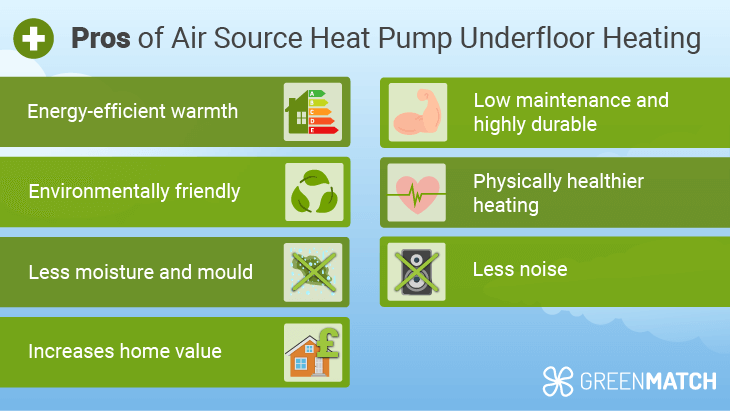
If the following benefits have gotten you interested in installing a heat pump, you’ll need to look at the latest prices in your area. You could go to various companies, contact them, and compare their prices, but that can take days. That’s why we recommend our service as a much faster alternative.
Fill out one simple, 30-second form and we’ll provide you with up to 4 free, non-binding quotes from reputable installers in your area. We’ve vetted them and we provide you with multiple options so you can be sure you’re getting the best prices. Click the button below to get started.
- Quotes from local engineers
- Payment by finance available
- Save £7,500 with BUS grant
It only takes 30 seconds



What are the disadvantages of heat pump underfloor heating?
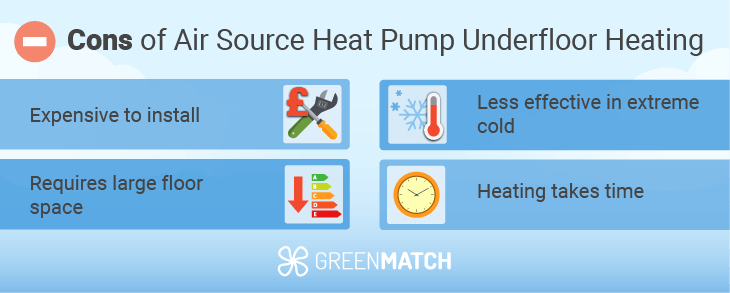
Is the combination of underfloor heating with an air source heat pump the right choice for my home?
Aside from all the factors mentioned above that decide whether underfloor heating is right for your home, you should also consider whether your home can accommodate a heat pump. Other factors you should consider include:
These factors can be difficult to keep track of when assessing your home. That’s why you’ll need the help of a reliable installer. Finding one that suits your price and specific needs can require days of strenuous research and price comparisons. Luckily, our service offers a far faster alternative that requires minimal effort on your part.
We can provide you with up to 4 free, non-binding quotes from trusted installers in your area. All you need to do is fill out a 30-second form and we’ll handle the rest. Click the button below to get started.
- Quotes from local engineers
- Payment by finance available
- Save £7,500 with BUS grant
It only takes 30 seconds



FAQ
Yes. With an air to water source heat pump, you can easily implement underfloor heating. However, there are multiple factors to consider before installing a heating system.
This can vary depending on the type of floor. Many floors, such as vinyl resin or laminate floors, begin to warp or succumb to other effects around 27°C to 30°C.
With an air source heat pump, underfloor heating provides warm air at low operating costs, higher sustainability, and increases the value of your home, among other benefits.
Air source heat pumps can work with both, however, more specifically, only air to water heat pumps are compatible with underfloor heating.

Rawal Ahmed is a writer at GreenMatch with an interest in sustainability and a background in tech journalism and digital marketing.
We strive to connect our customers with the right product and supplier. Would you like to be part of GreenMatch?

- How does underfloor heating with a heat pump work?
- Can you install air source heat pump underfloor heating in every home?
- Costs of an underfloor heating air source heat pump
- What are the best underfloor heating heat pumps?
- What are the advantages of heat pump underfloor heating?
- What are the disadvantages of heat pump underfloor heating?
- Is the combination of underfloor heating with an air source heat pump the right choice for my home?
- FAQ
